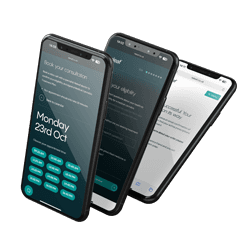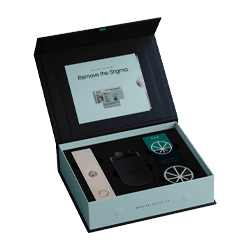However, in people suffering from diabetes, this insulin function does not work correctly, causing blood sugar levels to remain high. Type 1 diabetics do not produce enough insulin, and type 2 diabetics don’t respond to blood sugars as they should. That’s why they have to inject insulin at certain times to ensure levels remain safe.
If blood sugar levels are too high for extended periods, it can start to damage blood vessels, potentially leading to heart disease and other serious health problems. Very low blood sugar levels can also be extremely dangerous, leading to the possibility of seizures and even death.
CBD, or cannabidiol, is a phytocannabinoid compound found in medical cannabis plants. It has been studied extensively for its potential health benefits, including its ability to help regulate blood sugar levels. Although the research is not yet conclusive, some Studies have shown CBD’s potential to relieve the symptoms of varied health conditions, such as epilepsy, anxiety, inflammation and depression. However, there is also tentative evidence that CBD may also be of significant benefit in helping to lower blood sugars, as well as easing some of the other symptoms of diabetes.
Existing research on CBD and blood sugar
Can CBD oil help lower blood sugar levels?
The answer is, potentially, yes.
Although clinical trials are ongoing and more evidence is needed before CBD is accepted across the board at a clinical level, the early signs from trials appear to be very positive. For example, a 2021 study has shown signs that CBD may be a treatment option for people with type 2 diabetes who are unable to use standard management techniques. One patient was even able to discontinue the use of insulin, replacing it with CBD.
Another 2020 study focusing on animal models found that high doses of CBD were able to increase insulin levels in the blood and reduce glycaemia. However, there are yet to be any human trials that have replicated these results.
In terms of the other symptoms of diabetes, some 2019 research found that CBD could potentially offer protection against internal injuries from diabetes, and a 2021 study discovered CBD may help protect retinas, diabetes-related inflammation, and neurotoxicity.
Factors that influence CBD’s effects on blood sugar
As CBD is not currently used in a clinical way to control blood sugar, there are no authoritative guidelines about dosage. Looking around online, you can discover a wide range of information about dosage instructions, but when it comes to CBD, and medical cannabis dosages generally, it is best to speak with your doctor before trying anything.
Equally, you need to bear in mind the potency of any CBD products you are taking. A product labelled as 5% CBD will not have the same effect as one labelled 30%, for example. It is also worth looking at reviews and profiles of each product to help determine its effectiveness.
The amount of CBD required depends on a number of key factors, such as your age, severity and type of condition, exposure, and tolerance of CBD. It’s always advisable to seek the guidance of a doctor that is both knowledgeable and experienced in medical cannabis before taking any CBD product to help with a health condition.
Best practices for taking CBD to lower blood sugar
While CBD is not a miracle drug that’s going to offer a cure for diabetes or any other condition, if administered in the right way, it may offer benefits. First things first, clear it with your doctor before taking any cannabis derivative to ensure it won’t interfere with any existing medication.
You should consider taking a full spectrum CBD product, as the mixture of cannabinoids, flavonoids, and terpenes provides what scientists call the ‘entourage effect’ meaning you get a wider range of potential benefits, including reduced inflammation and lower insulin resistance. Your prescribing doctor will almost always advise that you start with a low dose and work up from there until you start to feel the positive effects.
Potential risks and side effects of CBD administration for blood sugar regulation
In general, the risks of taking CBD to reduce blood sugar is very low.
Most people have no adverse reaction and side effects tend to be mild, including dry mouth, nausea and diarrhoea. However, there are some more serious side effects to be aware of, too.
These can include suppressing immune responses and increasing the levels of some medications in the blood. That’s why you should always check with your doctor or a diabetes specialist before taking CBD.
In conclusion
While there is no clear clinical consensus about the efficacy of CBD for regulating blood sugar, that doesn’t mean that it has no beneficial effects. The clinical process takes time and CBD is a relatively new treatment option for this condition. In addition, there is a growing body of evidence that suggests CBD may potentially be an important future treatment, as you can see from the above.
And as The American Journal of Pathology has stated, “CBD was able to reduce oxidative stress, inflammation, cell death, and vascular hyperpermeability associated with diabetes”. It went on to add that “Oxidative stress and inflammation play critical roles in the development of diabetes and its complications.” So, CBD clearly has a role possible role to play, and we are waiting expectantly to see the outcomes of the new clinical trials that are currently underway.
Releaf understands the importance of medical cannabis in treating various medical conditions. With our tailored monthly packages, specialist consultations for medical cannabis, and a unique medical cannabis card for protection, you can access the treatment you need without worrying about the stigma.



